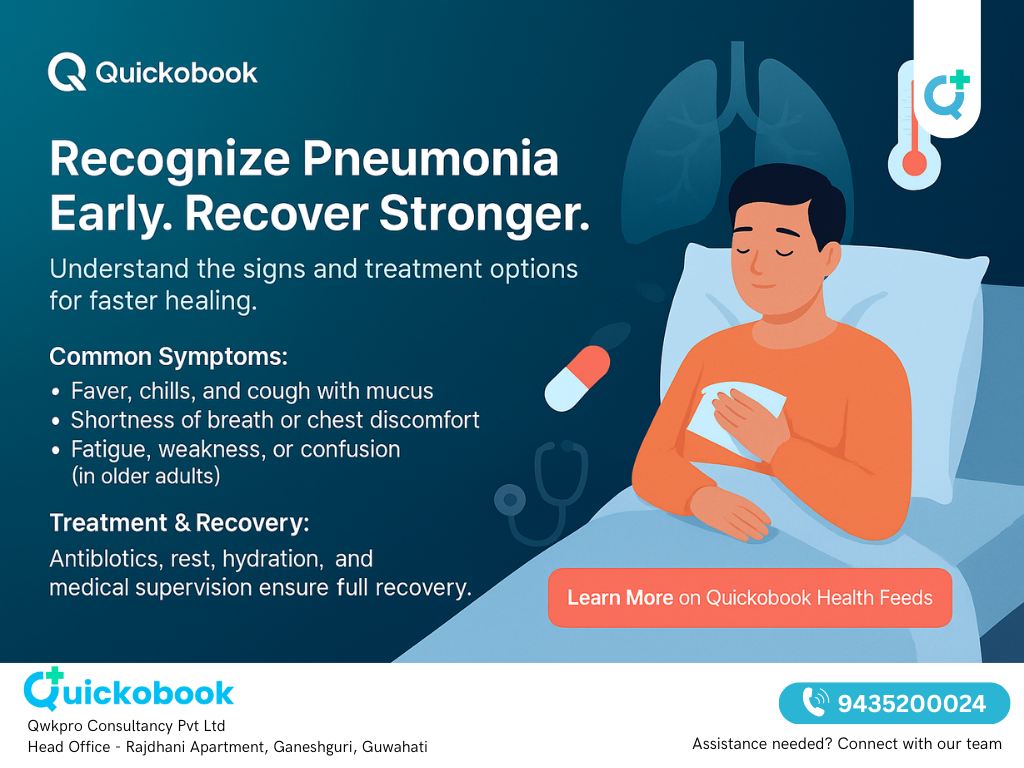Introduction: Understanding Pneumonia
Pneumonia is a serious lung infection that affects millions of Indians every year. It can range from mild to life-threatening, especially in infants, elderly individuals, and those with weak immunity. The infection inflames the air sacs (alveoli) in one or both lungs, causing them to fill with fluid or pus, leading to fever, chest pain, cough, and breathing difficulty. Early diagnosis and proper treatment are crucial to prevent complications.
What Causes Pneumonia?
Pneumonia is most often caused by bacteria, viruses, or fungi. Common causes include:
- Bacterial pneumonia: Often due to Streptococcus pneumoniae.
- Viral pneumonia: Caused by viruses like influenza or COVID-19.
- Fungal pneumonia: Common in people with weakened immunity.
Pneumonia can develop after a common cold, flu, or chronic illness that lowers your immune system.
Symptoms of Pneumonia
Symptoms may develop suddenly or gradually depending on the cause. The most common include:
1. Fever and Chills
High fever is one of the earliest signs. It may be accompanied by shivering or sweating.
2. Chest Pain
Sharp or stabbing chest pain that worsens while coughing or breathing deeply.
3. Cough
A persistent cough that produces yellow or green mucus.
4. Shortness of Breath
Difficulty breathing or rapid breathing due to fluid buildup in the lungs.
5. Fatigue and Weakness
Constant tiredness even after rest.
6. Loss of Appetite
A reduced desire to eat and general weakness.
7. Bluish Lips or Fingertips
Indicates low oxygen levels and requires immediate medical attention.
When to See a Doctor
Consult a doctor immediately if you have:
- Persistent fever over 101°F (38.5°C)
- Severe or worsening chest pain
- Difficulty breathing
- Cough with blood or thick phlegm
- Confusion, especially in older adults
You can easily book a Quickobook doctor appointment to consult a qualified physician or pulmonologist near you.
How Pneumonia Is Diagnosed
Diagnosis usually involves:
- Physical examination – Listening to lungs for crackling sounds.
- Chest X-ray – To detect infection and its extent.
- Blood tests – To identify infection type.
- Sputum test – To detect bacteria or virus.
- Pulse oximetry – To check oxygen levels.
Treatment Options for Pneumonia
Treatment depends on the cause and severity.
1. Bacterial Pneumonia
- Treated with antibiotics such as amoxicillin, azithromycin, or levofloxacin.
- Complete the full course even if symptoms improve early.
2. Viral Pneumonia
- Usually treated with rest, fluids, and antiviral medications if caused by influenza or COVID-19.
3. Fungal Pneumonia
- Requires antifungal medication.
Supportive Treatments
- Fever reducers: Paracetamol or ibuprofen.
- Cough medicine: Helps manage cough while keeping mucus loose.
- Oxygen therapy: For severe cases with low oxygen levels.
Always consult a healthcare provider before starting any medication. Book your Quickobook doctor appointment for expert guidance.
Recovery Tips for Pneumonia
Recovery can take from a few days to several weeks depending on the severity. Here’s how to recover faster:
- Rest Adequately – Allow your body to heal.
- Stay Hydrated – Drink plenty of water to thin mucus.
- Eat Nutritious Foods – Include fruits, vegetables, and protein-rich meals.
- Avoid Smoking and Alcohol – They slow down lung recovery.
- Take Medications on Time – Complete your antibiotic or antiviral course.
- Monitor Symptoms – Seek medical help if you feel worse.
Preventing Pneumonia
- Get vaccinated – Pneumococcal and flu vaccines reduce risk.
- Maintain hygiene – Wash hands frequently.
- Avoid exposure – Stay away from people with respiratory infections.
- Boost immunity – Eat well and exercise regularly.
Risks and Complications
Untreated or severe pneumonia can lead to:
- Lung abscess
- Respiratory failure
- Sepsis (blood infection)
- Pleural effusion (fluid around the lungs)
- Death in extreme cases
Early detection and treatment prevent complications.
READ ALSO: Shortness Of Breath – When To See A Pulmonologist
50 FAQs About Pneumonia
Q1. What is pneumonia?
A. Pneumonia is a lung infection that causes inflammation and fluid buildup in the lungs.
Q2. What causes pneumonia?
A. It can be caused by bacteria, viruses, or fungi.
Q3. What are common pneumonia symptoms?
A. Fever, chest pain, cough, shortness of breath, and fatigue.
Q4. Is pneumonia contagious?
A. Yes, it can spread through cough droplets and contact with infected people.
Q5. Can pneumonia go away on its own?
A. Mild viral pneumonia might, but bacterial pneumonia requires antibiotics.
Q6. How long does pneumonia last?
A. Usually 2–6 weeks depending on the type and treatment.
Q7. Is chest pain normal in pneumonia?
A. Yes, due to inflammation in the lungs.
Q8. Can pneumonia cause fever?
A. Yes, high fever is a key symptom.
Q9. How is pneumonia diagnosed?
A. Through X-rays, blood tests, and sputum analysis.
Q10. Can pneumonia be treated at home?
A. Mild cases can, but severe infections need hospitalization.
Q11. When should I see a doctor?
A. If you have high fever, chest pain, or difficulty breathing.
Q12. Can children get pneumonia?
A. Yes, especially those under five years old.
Q13. Is pneumonia dangerous for elderly people?
A. Yes, older adults are at higher risk of complications.
Q14. What foods help in pneumonia recovery?
A. Soups, fruits, vegetables, and protein-rich foods.
Q15. Can smoking cause pneumonia?
A. Yes, smoking damages lung defenses and increases infection risk.
Q16. Can pneumonia recur?
A. Yes, especially if immunity is weak or illness is untreated.
Q17. How to prevent pneumonia?
A. Vaccination, hygiene, and avoiding smoking.
Q18. Is pneumonia the same as bronchitis?
A. No, pneumonia affects the lungs, while bronchitis affects airways.
Q19. How long does fever last in pneumonia?
A. Typically 3–5 days after starting treatment.
Q20. Can pneumonia cause breathing difficulty?
A. Yes, due to inflammation and fluid in lungs.
Q21. Is pneumonia common after flu?
A. Yes, viral infections can weaken lungs and lead to pneumonia.
Q22. Can I exercise during pneumonia recovery?
A. Light activity after full recovery is fine; avoid overexertion.
Q23. Can antibiotics cure pneumonia?
A. Yes, bacterial pneumonia responds well to antibiotics.
Q24. What if I miss antibiotic doses?
A. It can cause relapse or antibiotic resistance.
Q25. Can pneumonia cause weight loss?
A. Yes, due to poor appetite and weakness.
Q26. What is walking pneumonia?
A. A mild form of pneumonia that doesn’t require hospitalization.
Q27. Can pneumonia lead to hospitalization?
A. Yes, if oxygen levels are low or symptoms are severe.
Q28. Can pneumonia affect only one lung?
A. Yes, it can affect one or both lungs.
Q29. Does pneumonia cause cough with blood?
A. Sometimes, in severe infections.
Q30. Can pneumonia spread at home?
A. Yes, through close contact and poor hygiene.
Q31. How is pneumonia different from COVID-19?
A. COVID-19 is viral pneumonia caused by the coronavirus.
Q32. Can I take paracetamol for fever?
A. Yes, as advised by your doctor.
Q33. What if pneumonia is left untreated?
A. It can cause severe complications and even death.
Q34. Can pneumonia cause long-term lung damage?
A. In severe cases, yes.
Q35. How is pneumonia treated in children?
A. With antibiotics, rest, and hydration under pediatric guidance.
Q36. Can cold weather cause pneumonia?
A. Cold weather doesn’t cause it directly but weakens immunity.
Q37. What is the recovery time after antibiotics?
A. Most people feel better within a week.
Q38. Can pneumonia be detected without an X-ray?
A. Not reliably; imaging confirms diagnosis.
Q39. Can allergies cause pneumonia?
A. No, but allergies can increase infection risk.
Q40. Should I isolate during pneumonia?
A. Yes, to prevent spreading infection.
Q41. Is pneumonia seasonal?
A. It’s more common during winter and flu season.
Q42. Can pneumonia cause back pain?
A. Yes, due to inflammation and coughing.
Q43. How can Quickobook help pneumonia patients?
A. You can book doctor appointments online for fast, reliable care.
Q44. Can antibiotics cause side effects?
A. Sometimes, mild stomach upset or diarrhea may occur.
Q45. Is pneumonia fatal?
A. It can be if untreated or in high-risk patients.
Q46. Can pneumonia affect the heart?
A. Yes, it can strain the heart due to low oxygen.
Q47. What is aspiration pneumonia?
A. Caused when food or liquid enters the lungs.
Q48. Can pneumonia be misdiagnosed as flu?
A. Yes, as early symptoms are similar.
Q49. Can I prevent pneumonia through vaccination?
A. Yes, pneumococcal and flu vaccines reduce risk.
Q50. How do I find a good doctor for pneumonia?
A. Use Quickobook doctor appointment to connect with trusted pulmonologists and physicians.
Conclusion
Pneumonia is treatable and preventable if caught early. Persistent fever, chest pain, or breathing issues should never be ignored. With timely care and rest, full recovery is possible.
Book Doctor appointment today to get professional help for pneumonia symptoms near you.
Disclaimer: This article is for educational purposes only. Always consult a licensed medical professional for diagnosis and treatment.










Comments (0)
No comments yet. Be the first to share your thoughts!
Leave a Comment